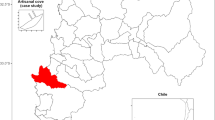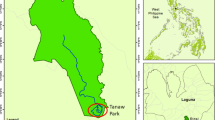Abstract
Lobstermen from each community along the coast of central Maine claim inshore fishing rights in particular areas. Although their claims are unrecognized by the state, they are well established and backed by surreptitious violence. Two kinds of lobstering territories exist, here termed “nucleated” and “perimeterdefended,” which differ essentially in the extent to which exclusive fishing rights are maintained. These differences in territorial organization affect the fishing effort of lobstermen, which in turn has a strong biological and economic impact.
Similar content being viewed by others
References
Acheson, J. M. (1972). The territories of the lobstermen.Natural History 81: 60–69.
Acheson, J. M. (1974). Variations in inshore fishing rights in Maine lobstering communities. In Andersen, R. (ed.),Northern Maritime Europeans, Mouton, The Hague.
Bailey, F. G. (1969).Strategems and Spoils, Schocken, New York.
Christy, F. T. (1973). Fishermen quotas: A tentative suggestion for domestic management. Occasional Paper 19, Law of the Sea Institute, University of Rhode Island, Kingston.
Christy, F. T., and Scott, A. (1965).The Common-Wealth in Ocean Fisheries, Johns Hopkins Press, Baltimore.
Crutchfield, J. (1964). The marine fisheries: A problem in international cooperation.American Economic Review Proceedings 54: 207–218.
Crutchfield, J. (1973). Resources from the sea. In English, T. S. (ed.),Ocean Resources and Public Policy, University of Washington Press, Seattle, pp. 105–133.
Crutchfield, J., and Pontecorvo, G. (1969).The Pacific Salmon Fisheries, Johns Hopkins Press, Baltimore.
De Wolf, G. (1974).The Lobster Fishery of the Maritime Provinces: Economic Effects of Regulations, Bulletin 187, Fisheries Research Board of Canada, Ottawa.
Dow, R. L. (1969). Cyclic and geographic trends in seawater temperature and abundance of American lobster.Science 164: 1060–1063.
Gordon, H. S. (1954). The economic theory of a common property resource.Journal of Political Economy 62: 124–142.
Hardin, G. (1968). The tragedy of the commons.Science 162: 1243–1248.
Hockett, C. F. (1973).Man's Place in Nature, McGraw-Hill, New York.
Krouse, J. S. (1973). Maturity, sex ratio, and size competition of the natural population of American lobster,Homarus americanus, along the Maine coast.Fishery Bulletin 71: 165–173.
Maine Sea and Shore Fisheries (1973).Maine Lobster Landings 1939 to Present, Statistical Bulletin No. 1, Department of Sea and Shore Fisheries, Augusta.
Pontecorvo, G. (1962). Regulation of the North American lobster fishery. In Hamlisch, R. (ed.),Economic Effects of Fishery Regulation, F.A.O. Fisheries Reports No. 5, Rome, pp. 240–267.
Pontecorvo, G. (1967). Optimization and taxation in an open-access resource: The fishery. In Gaffney, M. (ed.),Extractive Resources and Taxation, University of Wisconsin Press, Madison, pp. 157–167.
Pontecorvo, G., and Vartdal, K., Jr. (1967). Optimizing resource use: The Norwegian winter herring fishery.Statsφkonomisk Tidsskrift 2: 65–87.
Scott, A. (1955). The objectives of sole ownership.Journal of Political Economy 63: 118–124.
Thomas, J. (1973).An Analysis of the Commercial Lobster (Homarus americanus) Fishery Along the Coast of Maine, August 1966 Through December 1970, National Oceanic and Atmospheric Administration Technical Report, National Marine Fisheries Service, Washington, D.C.
Wilson, J. A. (1975). The tragedy of the commons: A test. In Baten and Hardin, G. (eds.),Managing the Commons, Freeman, San Francisco.
Author information
Authors and Affiliations
Additional information
On leave 1974–1975 to serve with the National Marine Fisheries Service, Washington, D.C.
The research on which this paper is based was financed by the National Marine Fisheries Service (Contract No. N-043-30-72) and a Faculty Research Grant from the University of Maine in 1973.
Rights and permissions
About this article
Cite this article
Acheson, J.M. The lobster fiefs: Economic and ecological effects of territoriality in the maine lobster industry. Hum Ecol 3, 183–207 (1975). https://doi.org/10.1007/BF01531640
Received:
Revised:
Issue Date:
DOI: https://doi.org/10.1007/BF01531640




